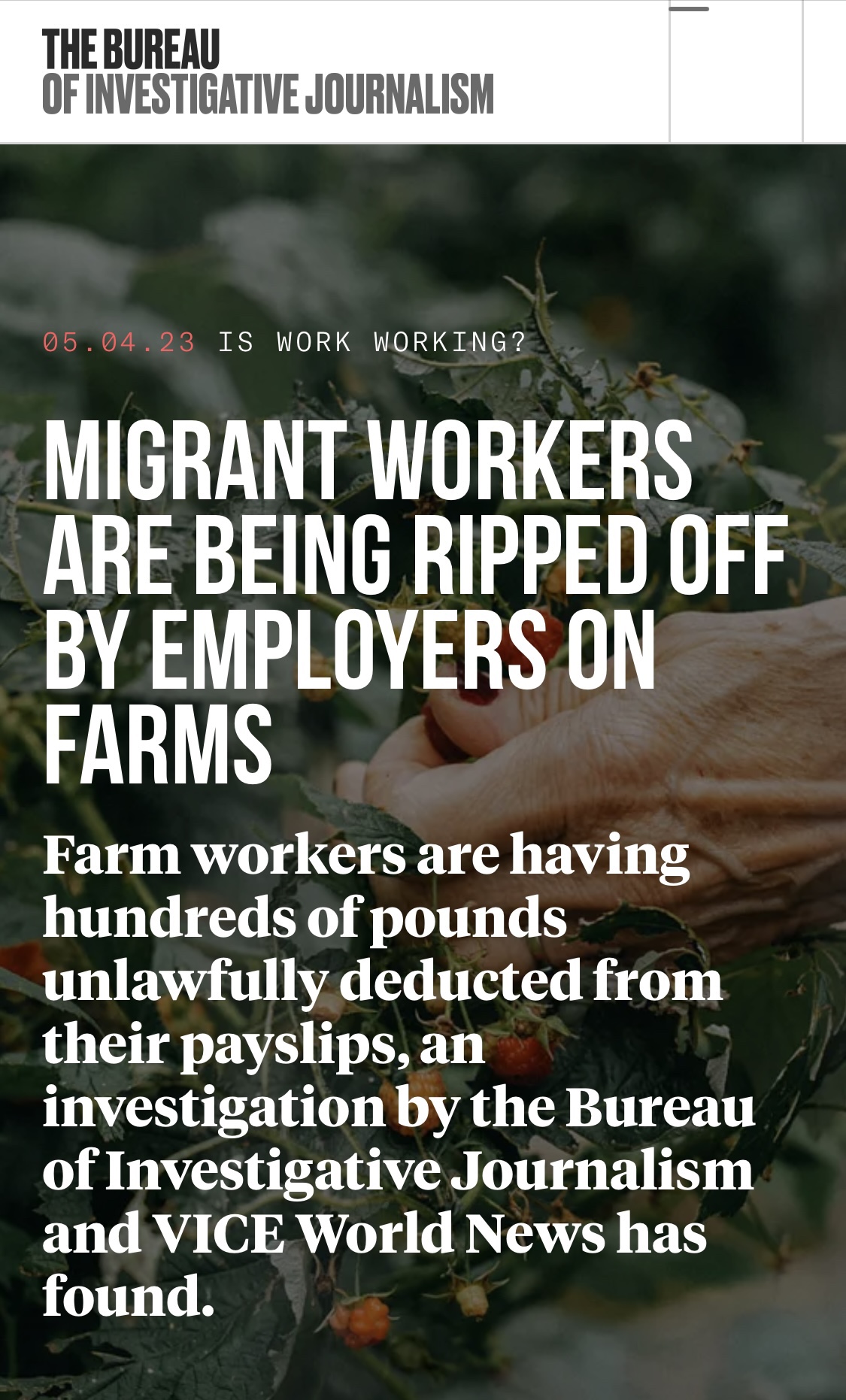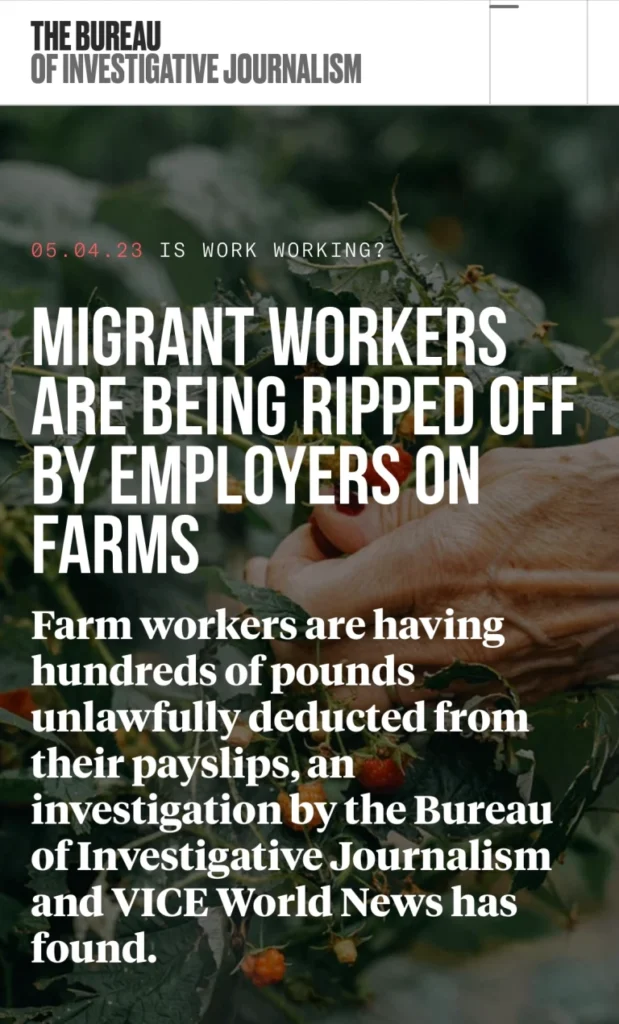05.04.23 IS WORK WORKING?
Migrant workers are being ripped off by employers on farms

Original source: https://www.thebureauinvestigates.com/stories/2023-04-05/migrant-workers-on-uk-farms-owed-hundreds-after-widespread-wage-theft
Farm workers are having hundreds of pounds unlawfully deducted from their payslips, an investigation by the Bureau of Investigative Journalism and VICE World News has found.
Published April 5 2023
This story was published in partnership with:

Find out how to use the Bureau’s work
Migrant agricultural workers who travelled thousands of miles to plug labour gaps on UK farms have faced unlawful wage deductions, the Bureau of Investigative Journalism and VICE World News can reveal.
Research by TBIJ and VICE World News, along with case work data from the Work Rights Centre, found that more than 20 people working at nine farms across the UK reported being underpaid – by more than £1,000 in at least two cases.
Among the workers is Sapana Pangeni from Nepal. She worked at EU Plants Ltd in Berkshire between November 2022 and January 2023, and was paid only two-thirds of what she was owed. Despite working roughly six hours a day for six days a week, she earned just under £2,000 over the two months. Pangeni’s payslips, bank statements and a personal log of the hours she worked show she was underpaid by more than £1,000 while at the farm.
Six other workers at EU Plants, one of the UK’s largest producers of strawberry and raspberry plants, also said they had been underpaid. They said their payslips did not correctly reflect the hours they had worked. When workers tried to check how their hours were being recorded by the field supervisor, they were yelled at, four of them said.
Sunita Khadka, who said she worked on the farm for just under a month, was paid only £428, according to bank statements. Three other workers’ payslips showed they had earned between £700-£950, after deductions, working six-day weeks over about a month.
£16 a day
When the workers first arrived at the farm, they were told they would be paid for the amount of work they did – such as for the number of plants they prepared – not the hours they worked. Khadka said she thought it would have worked out to be better paid that way, but when her payslip arrived, she realised she was much worse off. “The first day we worked for like five hours, six hours, something like that. But [for] my first day they pay me only £16,” she said.
‘It was a really hard time, it was really cold, snowing, we work in the field and it was really cold, I was really freezing … the worst experience’
Only later did the workers discover that, by law, they should have been paid for every hour worked, Pangeni said. Pangeni’s colleagues raised this with the farm, but their concerns were dismissed. The rules of the migrant farm workers’ visas required them to be paid at least £10.10 an hour up until April 2023.
Seasonal workers also have rent and electricity deducted from their pay, which falls within the law, but the scheme rules say workers should not be charged for any equipment they need to do their jobs. However, some workers at EU Plants said they had to buy their own gloves and boots, as well as electric heaters to warm their caravans during winter.
“It was a really hard time because it was really cold, snowing, and we work in the field … I was really freezing … the worst experience,” Khadka said.
Risk of exploitation
Pangeni is among the nearly 35,000 migrant workers who came to work in the UK on six-month seasonal worker visas last year. Human rights groups have consistently warned that the visa’s structure, and the lack of enforcement of employment and visa regulations, put people at risk of exploitation. But the government has steadily increased the number of visas issued since 2019. As many as 55,000 could be issued this year.

Sunita Khadka was paid only £428 after just under a month of work at EU PlantsOliver Kemp/TBIJ
Pangeni said that within a few weeks of arriving in the UK, she and some of her colleagues ran out of money and struggled to cover basic living costs. A friend gave her £60 for groceries, which she then shared with other Nepali workers at the farm who were also too broke to buy food.
After working on farms for more than four months, Pangeni has only recently recouped the £1,500 she spent on her visa and flights to the UK. The financial pressure was even bigger because she supports other people. She sends money back home for her parents and gives £120 every month to an orphan she supports financially.
Read more from this project‘They treat you like an animal’: How British farms run on exploitation
The UK government has said that it is the responsibility of the recruiters who sponsor the workers’ visas to monitor and ensure their welfare. But, in practice, the scheme’s rules are rarely enforced.
Adis Sehic, a policy officer at the Work Rights Centre, said many people have approached the charity with complaints of wage theft over the last year. He said the government needs to provide a quick and clear means for redress. “This should take into account the short-term nature of seasonal worker placements and the fact that some affected workers are forced to leave the UK before they can be paid back in full,” he said.
Franck Magennis, employment barrister at Garden Court Chambers who specialises in bringing claims on behalf of migrant workers, said that people on short-term visas are particularly vulnerable to this kind of exploitation. “Language barriers, growing racism, the precarious nature of their immigration status and shortcomings with British trade unions combine to make it much more difficult for migrant workers to fight back,” he said.
Transferred but left short
Pangeni emailed her visa sponsor and recruiter, AG Recruitment, in January to explain that she had been underpaid, and that the hours on the payslip did not reflect the hours she had worked. “It is getting harder to pay for groceries and living expenses,” she wrote at the time.
She added: “Most of the other friends already left the current management here. So I am working here under frustration and very bad working conditions.”
Following her complaint, AG Recruitment transferred Pangeni to another farm, but she said she was not compensated for the money she was owed.
TBIJ and VICE World News have seen WhatsApp messages from other workers complaining about underpayment to AG Recruitment. One of the workers said in his message that he and his colleagues had been working from 9am to 4pm each day, but that the farm was putting fewer hours on their payslips.
‘We leave our family, we came here to learn something new and earn money, but their behaviour break us really badly’
AG Recruitment said that, if necessary, it would report issues to the Gangmasters and Labour Abuse Authority (GLAA), the government agency responsible for tackling exploitation in the agriculture sector. It would not be drawn on whether a report was made in Pangeni’s case.
The GLAA said it would not comment on individual cases but will investigate alleged breaches and have sanctions available. The GLAA urges anyone with evidence of exploitation or forced labour, to report them.
This all comes too late for Khadka, who has now left the UK and has little hope of recovering her unpaid earnings. “We left our family, we came here to learn something new and earn money,” she said. “But their behaviour broke us really badly.”
EU Plants Ltd did not respond to multiple requests for comment.
Header image: Hand picking raspberries from the plant. Credit: Stefania Pelfini, La Waziya Photography
Related Background News and Articles on UK Seasonal Worker Scheme Abuse and Exploitation
LATEST ARTICLE: Financial Times 30th March 2023: UK retailers urged to compensate Nepalese and Indonesian ex-farm workers
1. UK Seasonal Worker scheme endangers vulnerable foreign workers (My Opinion – BHRRC Blog Series 17th March 2023
2. ‘They treat you like an animal’ – How British farms run on exploitation (VICE World News/TBIJ, 27th March 2023)
public-letter-swv-28-march-23-Download
3. The Murky Business Behind Britain’s Rampant Food Price Inflation (Bloomberg, 24th March 2023)
4. UK supermarkets to fund audits on farms to prevent worker exploitation (Financial Times, 11th Mar 2023)
5.Unions and NGOs Demand Reform to UK’s ‘Abusive’ Farm Worker Visa Programme (VICE World News 28th Mar 2023)
6. Working in the UK: Thousands of Indonesian citizens have lost hope of leaving in 2023 (BBC Indonesia, 7th Mar 2023)
7. Farm workers on UK seasonal visas to be guaranteed 32 hours a week(Guardian, 24th Feb 2023)
8. AG Recruitment, UK recruiter of debt-hit Indonesian and Nepali migrant workers, loses seasonal workers scheme license following forced labour related allegations, worker abscondments and asylum claims (Guardian, 10th Feb 2023)
9. UK farmers stop recruiting Nepalese workers after exploitation warning(Financial Times, 28th January 2023)
10. Home Office accepts recommendations in Chief Inspector’s report on immigration system as it relates to the agricultural sector (Freeths, 16th Jan 2023)
11. Immigration: Investors warn food companies about risk of forced labour on UK farms (Financial Times 19th Dec 2022)
12. Investor statement on the UK Seasonal Worker Scheme (Public Investor Statement 19th Dec 2022)
investor-statement-on-the-seasonal-worker-schemeDownload
13. Seasonal fruit pickers from Nepal left thousands in debt after being sent home early from UK farms (Guardian, 13th Nov 2022)


